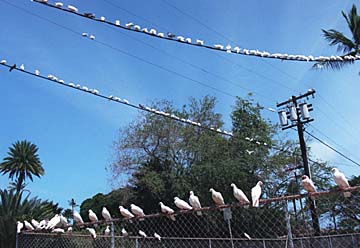


Studying birds can
teach us a lot about
ourselvesAn expert in biology says we
By Helen Altonn
have more to learn
Star-BulletinIf Robert E. Ricklefs had a choice of being a bird, it wouldn't be one with a beautiful song or feathers.
It would probably be one with a long life span and sociability -- such as the raven or parrot, the distinguished evolutionary ecologist said in an interview.
Ricklefs, in the biology department of the University of Missouri in St. Louis, studies the life history of birds. He has written several texts and other books on questions relating to biology and ornithology.
He was the "distinguished visitor" last week at the University of Hawaii Zoology Department's 24th Annual Albert Tester Memorial Symposium. He gave lectures on "Evolution of Aging in Birds and Mammals" and "Taxon Cycle in the Lesser Antillean Avifauna."
Aging in birds, one area of his major interests, comes out of life histories and factors that affect their lives, he said.
Wild animals are believed to die mostly because of predators and bad weather affecting their food supply, he said.
But studies of wild bird populations indicate they generally live longer than mammals and die of old age, he said.
He said longevity increases with body size, and birds the same size as mammals live three to four times longer than the mammals.
"Humans and primates in general have a long life compared to other animals, as do bats -- flying animals," he said.
But there's a tremendous amount of variation, he added. "We're trying to understand how different lifestyles affect aging."
Seabirds are among those with the longest lives, he said, noting the albatross has a life span like humans. "It's remarkable."
Highly social birds also seem to live longer, he said. "We don't know if it's cause or effect."
Many birds live longer in captivity because dangers are removed but they die of the same diseases as flocks in nature, he said.
They may also suffer stresses of other kinds, he said.
"The interesting thing is there is a lot of variation in the way the animals age, their lifestyle and intrinsic mortality ...
"For medical applications, there is a lot of variation we don't understand that may give us some clues that affect human aging."
Many long-lived seabirds don't breed for more than 10 years, he said. "They may spend that time learning and gaining experience to exploit marine resources.
"It is an incredible mental feat to store all of the information."